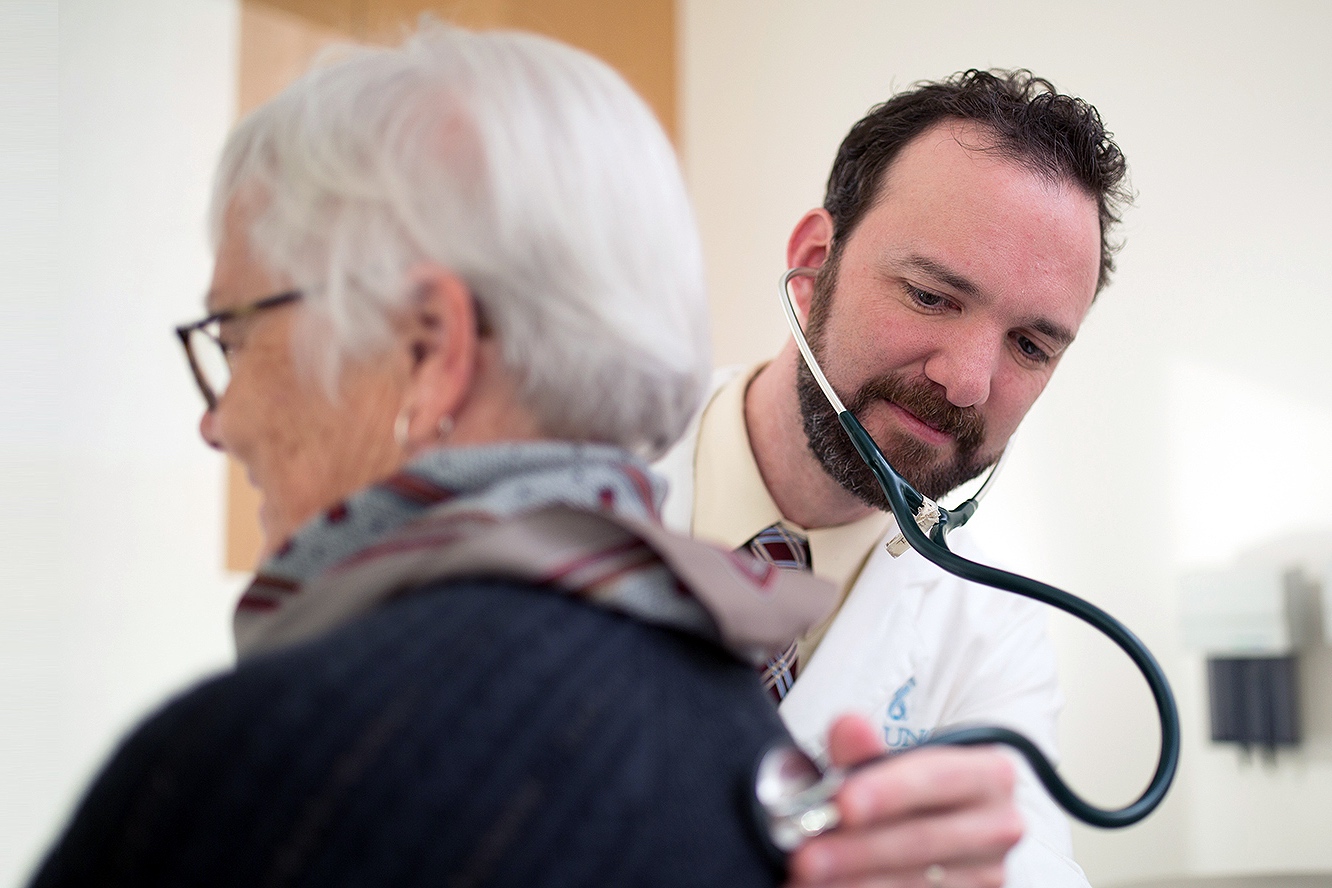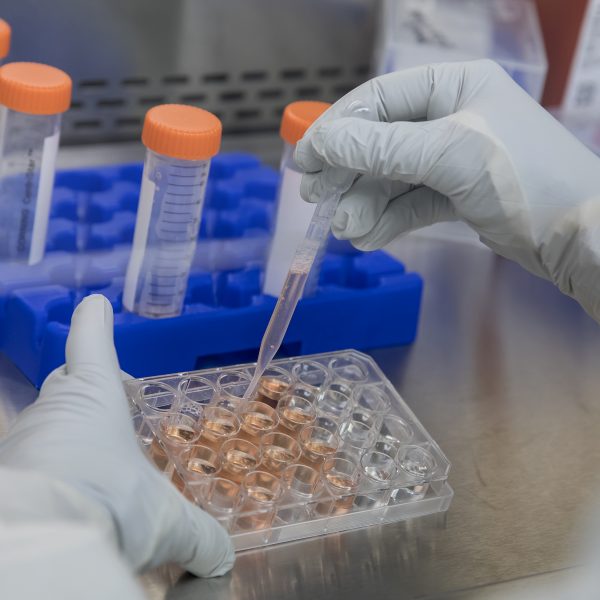Clinical Trials


Immunotherapy Clinical Trials at UNC Lineberger
UNC Lineberger’s Clinical Immunotherapy Program is conducting chimeric antigen receptor T-cell (CAR-T) clinical trials and other cellular immunotherapy clinical trials that are currently open for patient accrual. These experimental treatments involve re-engineering cells from the patient’s immune system to recognize and direct the attack against the patient’s cancer.
Pediatric Immunotherapy Clinical Trials
Relapsed/Refractory Neuroblastoma/Relapsed/Refractory Osteosarcoma
LCCC1743-ATL: A Phase I Study of Autologous Activated T-Cells Expressing a 2nd Generation GD2 Chimeric Antigen Receptor, IL-15, and iCaspase9 Safety Switch Administered To Patients with Relapsed/Refractory Neuroblastoma or Relapsed/Refractory Osteosarcoma
This trial combines two different ways of fighting disease: antibodies and T cells. Both antibodies and T cells have been used to treat patients with cancers, and both have shown promise, but neither alone has been sufficient to cure most patients.The primary purpose of this study is to determine whether receiving iC9.GD2.IL-15 T cells is safe and tolerable in patients with relapsed/refractory neuroblastoma or relapsed/refractory osteosarcoma.
Principal Investigator: George Hucks, MD
Relapsed/Refractory Acute Lymphoblastic Leukemia
LCCC1541-ATL: Phase I Study of the Administration of Autologous CAR-T Cells Targeting the CD19 Antigen and Containing the Inducible Caspase9 Safety Switch in Patients with Relapsed/Refractory Acute Lymphoblastic Leukemia
The primary purpose of this study is to determine whether receiving iC9-CAR19 cells is safe and tolerable and later to determine an optimal dose of AP1903 to be given to subjects to alleviate severe cytokine release syndrome or neurological complications from CAR T cell therapy.
Principal Investigator: Natalie Grover, MD
Relapsed/Refractory CD30+ Hodgkin’s Lymphoma and CD30+ Non-Hodgkin’s Lymphoma
LCCC1532-ATL: Phase Ib/II Study of the Administration of T lymphocytes Expressing the CD30 Chimeric Antigen Receptor (CAR) for Relapsed/Refractory CD30+ Hodgkin’s Lymphoma and CD30+ Non-Hodgkin’s Lymphoma
This trial studies the efficacy of CAR T cells targeting CD30 in treating patients with relapsed/refractory CD30+ Hodgkin lymphoma or non-Hodgkin lymphoma that expresses CD30. Patients who have failed treatment with autologous or allogeneic stem cell transplantation are eligible for this therapy.
Principal Investigator: Anne Beaven, MD
Adult Immunotherapy Clinical Trials
Autologous CAR T-Cells Targeting the GD2 Antigen for Lung Cancer
NCT05620342: Administration of T Cells Expressing a 2nd Generation GD2 Chimeric Antigen Receptor, IL-15, and iCaspase9 Safety Switch in Subjects With Lung Cancer
This is a phase 1, single-center, open-label study that enrolls adult subjects with extensive stage lung cancer or stage IV non-small cell lung cancer that is platinum-refractory and received PD-1 and/or PD-L1 therapy. The purpose of this study is to test the safety of using a new treatment called autologous T lymphocyte chimeric antigen receptor cells against the GD2 antigen (iC9-GD2.CAR.IL-15 T cells) in subjects with lung cancer. How much (dose) of the iC9-GD2.CAR.IL-15 T cells are safe to use without causing too many side effects and what is the maximum dose that could be tolerated will be studied.
Principal Investigator: Jared Weiss, MD
Relapsed or Refractory Glioblastoma
NCT05366179: Phase 1 Study of Autologous CAR-T Cells Targeting B7-H3 in Recurrent or Refractory GBM CAR.B7-H3Tc
This is a single center, open-label study aims to determine the safety of escalating doses of chimeric antigen receptor T cells (CAR-T) cells targeting the B7-H3 antigen administered via intraventricular infusion to adult subjects with relapsed or refractory glioblastoma.
Principal Investigator: Yasmeen Rauf, MD
Nonseminomatous Germ Cell Tumors
NCT05634785: Phase 2 Study of the Administration of T Lymphocytes Expressing the CD30 Chimeric Antigen Receptor (CAR) for Patients With CD30+ Nonseminomatous Germ Cell Tumors (NSGCT)
The purpose of this study is to create a repository and explore the presence of modified T cells in the subject’s plasma or tumors. This research study combines two different ways of fighting disease: antibodies and T cells. They both have shown promise, but neither alone has been sufficient to cure most patients. This study is designed to combine both T cells and antibodies to create a more effective treatment called autologous T lymphocyte chimeric antigen receptor cells targeted against the CD30 antigen (ATLCAR.CD30) administration.
Principal Investigator: Matthew Milowsky, MD, FASCO
Metastatic Non-Small-Cell Lung Cancer
NCT04614103: Phase 2 Multicenter Study of Autologous Tumor Infiltrating Lymphocytes (LN-145) in Patients With Metastatic Non-Small-Cell Lung Cancer
LN-145 is a ready-to-infuse, autologous TIL therapy that utilizes an autologous TIL manufacturing process, as originally developed by the NCI and further optimized by Iovance for the treatment of patients with metastatic NSCLC. The cell transfer therapy used in this study involves patients receiving an NMA lymphocyte depleting preparative regimen, followed by infusion of autologous TIL, then finally followed by the administration of IL-2.
Principal Investigator: Jared Weiss, MD
Recurrent Epithelial Ovarian Cancer
LCCC1818-ATL: Phase 1 Study of Autologous Activated T-cells Targeting the B7-H3 Antigen in Subjects with Recurrent Epithelial Ovarian Cancer
The purpose of this study is to test the safety CAR.B7-H3 T cells for treating ovarian cancer. This is the first time CAR.B7-H3 cells are being tested in treatment of ovarian cancer. This study will test different doses of CAR.B7-H3 cells to see which dose is safer to be used in people. CAR.B7-H3 T cell therapy has been not approved by the Food and Drug Administration (FDA) for the treatment of epithelial ovarian cancer.
Principal Investigator: Linda Van Le, MD
Relapsed/Refractory Multiple Myeloma
LCCC1603-ATL: Phase I Study of the Administration of Autologous CAR-T cells Targeting the CD138 Antigen in Patients with Relapsed/Refractory Multiple Myeloma
The primary purpose of this study is to determine whether the administration of CAR T cells targeting CD138 is safe and tolerable and to evaluate an optimal dose of cells to give as treatment.
Principal Investigator: Sascha Tuchman, MD
CD30+ Relapsed/Refractory Hodgkin Lymphoma and CD30-expressing T cell lymphoma
LCCC1606-ATL: Phase I Study of the Administration of Autologous CAR-T cells Targeting the CD30 Antigen and Expressing CCR4 in Patients with CD30+ Relapsed/Refractory Hodgkin Lymphoma and CD30-expressing T cell lymphoma
The trial evaluates the safety and tolerability of CAR T cells targeting CD30 in patients with CD30-expressing Hodgkin or T cell lymphomas, including cutaneous T cell lymphomas. The trial also evaluates whether the inclusion of CCR4 into the CAR treatment will enhance the presence of CAR T cells at tumor sites.
Principal Investigator: Natalie Grover, MD
Relapsed/Refractory Acute Lymphoblastic Leukemia
LCCC1541-ATL: Phase I Study of the Administration of Autologous CAR-T Cells Targeting the CD19 Antigen and Containing the Inducible Caspase9 Safety Switch in Patients with Relapsed/Refractory Acute Lymphoblastic Leukemia
The primary purpose of this study is to determine whether receiving iC9-CAR19 cells is safe and tolerable and later to determine an optimal dose of AP1903 to be given to subjects to alleviate severe cytokine release syndrome or neurological complications from CAR T cell therapy.
Principal Investigator: Natalie Grover, MD
Relapsed/Refractory Kappa+ Mantle Cell and Indolent Non-Hodgkin Lymphoma
LCCC 1811-ATL: Phase 1 Study of the Administration of T lymphocytes Expressing the Kappa Chimeric Antigen Receptor (CAR) and CD28 Endodomain for Relapsed/Refractory Kappa+ Mantle Cell and Indolent Non-Hodgkin Lymphoma
This Phase 1 study will combine both T cells and antibodies in order to create a more effective treatment. The treatment tested in this study uses modified T-cells called Autologous T Lymphocyte Chimeric Antigen Receptor (ATLCAR) cells targeted against the kappa light chain antibody on cancer cells. The purpose of this study is to determine whether receiving the ATLCAR.κ.28 cells is safe and tolerable and learn more about the side effects and how effective these cells are in fighting lymphoma.
Principal Investigator: Natalie Grover, MD
Relapsed/Refractory B cell Non-Hodgkin Lymphoma
LCCC1813-ATL: Administration of Autologous CAR-T Cells Targeting the CD19 Antigen and Containing the Inducible Capsase 9 Safety Switch in Patients with Relapsed/refractory B-cell Non-Hodgkin Lymphoma
This Phase 1 study is the first step in determining whether giving iC9-CAR19 cells can be used to treat lymphoma and to determine if AP1903 can be used to successfully activate the safety switch in the iC9-CAR19 cells limiting the severity of cytokine release syndrome and/or neurotoxicity.
Principal Investigator: Natalie Grover, MD
Relapsed/Refractory CD30+ Peripheral T Cell Lymphoma
LCCC1904-ATL:Phase II Study of the Administration of T Lymphocytes Expressing the CD30 Chimeric Antigen Receptor (CAR) for Relapsed/Refractory CD30+ peripheral T Cell Lymphoma
This is a research study to determine the safety and tolerability of ATLCAR.CD30 for treating relapsed/refractory Peripheral T Cell Lymphoma. To prepare the body for the ATLCAR.CD30 cells, participants will complete lymphodepletion with two chemotherapy agents.
Principal Investigator: Anne Beaven, MD
